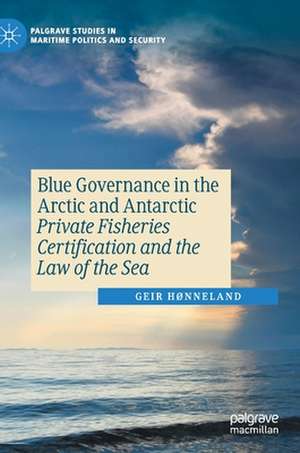Blue Governance in the Arctic and Antarctic: Private Fisheries Certification and the Law of the Sea: Palgrave Studies in Maritime Politics and Security
Autor Geir Hønnelanden Limba Engleză Hardback – 10 iun 2021
Preț: 388.92 lei
Preț vechi: 422.74 lei
-8% Nou
Puncte Express: 583
Preț estimativ în valută:
74.43€ • 77.42$ • 61.45£
74.43€ • 77.42$ • 61.45£
Carte disponibilă
Livrare economică 25 martie-08 aprilie
Livrare express 08-14 martie pentru 25.07 lei
Preluare comenzi: 021 569.72.76
Specificații
ISBN-13: 9783030725846
ISBN-10: 3030725847
Pagini: 100
Ilustrații: XIII, 100 p. 4 illus.
Dimensiuni: 148 x 210 x 15 mm
Greutate: 0.29 kg
Ediția:1st ed. 2021
Editura: Springer International Publishing
Colecția Palgrave Macmillan
Seria Palgrave Studies in Maritime Politics and Security
Locul publicării:Cham, Switzerland
ISBN-10: 3030725847
Pagini: 100
Ilustrații: XIII, 100 p. 4 illus.
Dimensiuni: 148 x 210 x 15 mm
Greutate: 0.29 kg
Ediția:1st ed. 2021
Editura: Springer International Publishing
Colecția Palgrave Macmillan
Seria Palgrave Studies in Maritime Politics and Security
Locul publicării:Cham, Switzerland
Cuprins
Introduction.- The precautionary approach, implementation and state practice.- The MSC Certification Scheme and the precautionary approach.- MSC certification of Arctic and Antarctic fisheries.- Influence on fisher behaviour and state practice.- Conclusion.
Notă biografică
Geir Hønneland is Adjunct Professor at the Fridtjof Nansen Institute and Nord University, Norway. He holds a Ph.D. in political science and an LL.M. in the law of the sea and has published a number of books on international ocean governance, Arctic politics and Russian identity.
Textul de pe ultima copertă
This book discusses to what extent the precautionary approach to fisheries management is reflected in the MSC Fisheries Standard and in the certification of four clusters of fisheries in polar waters. Certification according to private sustainability standards (ecolabelling) has become an important addition to public fisheries management in recent years. The major global ecolabel in terms of comprehensiveness and coverage is the Marine Stewardship Council (MSC) Fisheries Standard. Becoming and remaining certified requires continuous behavioural adaptation from fisheries through a fine-meshed system of improvement conditions attached to certification. Focus is on how certification has influenced fisher behaviour and state practice. In the Southern Ocean krill and toothfish fisheries, MSC certification has generated new scientific knowledge about the stocks. In the Barents Sea cod and haddock fisheries, fishing companies have voluntarily adapted their behaviour to reduce the fishery’s impacts on endangered, threatened and protected species and bottom habitats. In the local lumpfish fisheries in Greenland, Iceland and Norway, measures have been introduced to reduce the effects on seabirds and marine mammals. In the Northeast Atlantic mackerel fisheries, impacts have been more modest. Private certification is no panacea, but it seems to have found a niche as a supplement to national legislation and international agreements.
Geir Hønneland is Adjunct Professor at the Fridtjof Nansen Institute and Nord University, Norway. He holds a Ph.D. in political science and an LL.M. in the law of the sea and has published a number of books on international ocean governance, Arctic politics and Russian identity.
Caracteristici
Discusses to what extent the precautionary approach to fisheries management is reflected in the MSC Fisheries Standard and in the certification of four clusters of fisheries in polar waters Focuses on how certification has influenced fisher behavior and state practice Presents measures introduced to reduce fisheries’ impacts on fish stocks and marine ecosystems








